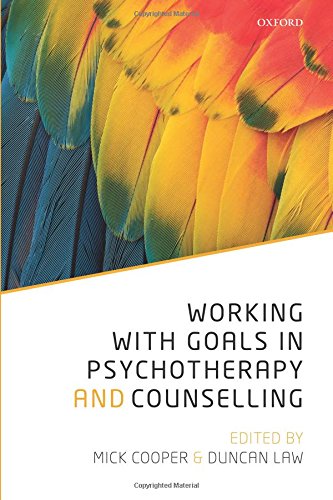This interactive workshop provides participants with an opportunity to develop their understanding of goals in counselling and psychotherapy, and to develop their skills and knowledge in this area. The workshop is particularly oriented towards participants from a humanistic or integrative background: who are interested in an understanding their clients as agentic and purpose-oriented beings, but wary of more mechanistic or ‘outcome-oriented’ goal-based approaches. The workshop starts by introducing the concept of ‘directionality’—that human beings are always oriented towards future possibilities—and looks at how this can be applied to an understanding of self. The workshop then explores what has been learnt from the psychological research about the nature of goals and goal processes (for instance, distinguishing between 'approach' and 'avoidance' goals). It then goes on to a more practical exploration of working with goals, including skills practice and video demonstrations.
A pre-recorded, online version of this workshop can be accessed here.
Learning outcomes
By the end of this workshop, participants will be able to:
Define the concept of ‘directionality’ and be able to apply this to an understanding of their own psychological processes
Discuss the theory and evidence that relates 'goal actualisation' and goals types to psychological wellbeing and distress
Apply basic goal-oriented practices in counselling and psychotherapy, including goal discussion and goal setting
Use the Goals Form in an appropriate manner
Schedule
Session 1: Directionality: The actualisation of our deepest directions
Session 2: Goal dimensions: ‘Not all goals are created equal’
Session 3: Basic principles and methods for working with goals in counselling and psychotherapy
Session 4: Using the Goals Form
Format
This workshop is typically delivered as a one day event. However, it can also be delivered as a shorter workshop or presentation.
The workshop combines self-development exercises, theoretical input, practical exercises, and small and large group discussion.
The workshop is appropriate for training and practising counsellors, psychotherapists, counselling psychologists and other mental health professionals.
Resources
The Goals Form (Blank, Word version) [Translations: Chinese, Ukrainian]
The Goals Form: Instructions for use (pdf) [Translations: Chinese]
The Goals Form: Psychometric paper (open access)
Books
Research publications
Cooper, M., & Xu, D. (2022). The Goals Form: Reliability, validity, and clinical utility of an idiographic goal-focused measure for routine outcome monitoring in psychotherapy. Journal of Clinical Psychology. https://doi.org/10.1002/jclp.23344
Cooper, M. (2021). Directionality: Unifying psychological and social understandings of wellbeing and distress through an existential ontology. The Journal of Humanistic Counseling, 60, 6-25. https://doi.org/10.1002/johc.12148 (open access)
Cooper, M. (2019). Integrating counselling and psychotherapy: Directionality, synergy and social change. London: Sage.
Di Malta, G. S., Oddli, H. W., & Cooper, M. (2019). From intention to action: A mixed methods study of clients’ experiences of goal-oriented practices. Journal of Clinical Psychology, 75(10), 1770-1789. https://doi.org/10.1002/jclp.22821
Lloyd, C., Duncan, C., & Cooper, M. (2019). Goal Measures for psychotherapy: A systematic review of self-report, idiographic instruments. Clinical Psychology: Science and Practice, 26(3). https://doi.org/10.1111/cpsp.12281
Law, D. & Cooper, M. (eds.) (2018). Working with goals in counselling and psychotherapy, Oxford: Oxford University.
Cooper, M. (2018). The psychology of goals: A practice-friendly review. In M. Cooper & D. Law (Eds.), Working with goals in counselling and psychotherapy. Oxford: Oxford University.
Cooper, M. (2014). Wants: A core humanistic construct. Self and Society, 42(3-4), 30-36.
Rupani, P., Cooper, M., McArthur, K., Pybis, J., Cromarty, K., Hill, A., . . . Turner, N. (2014). The goals of young people in school-based counselling and their achievement of these goals. Counselling and Psychotherapy Research, 14(4), 306-314. doi: 10.1080/14733145.2013.816758
Cooper, M. (2013). The intrinsic foundations of extrinsic motivations and goals: Towards a unified humanistic theory of wellbeing. Journal of Humanistic Psychology, 53(2), 153-171
Videos
A demonstration of working with goals in an initial assessment session, using the Goals Form
A review of the psychological evidence on working with goals


